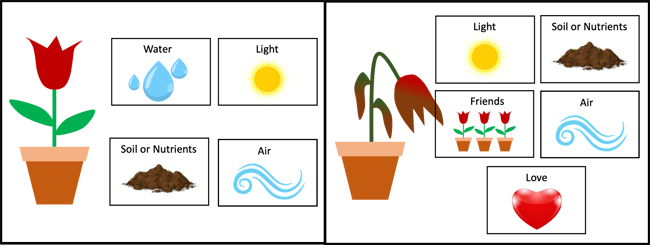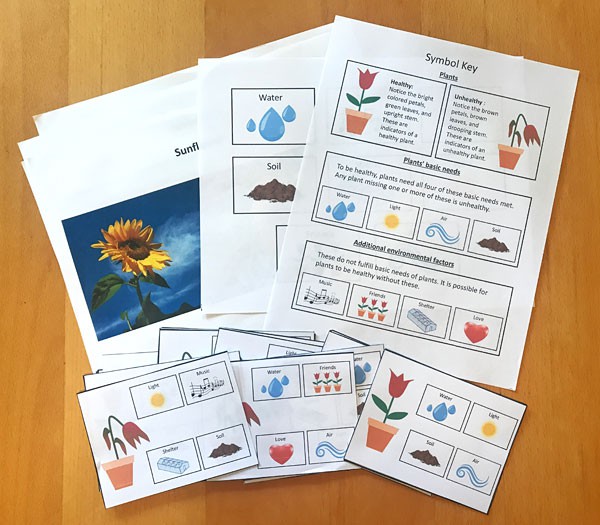Doctor, What Does My Plant Need?
Summary

Overview
In this lesson, students will role-play a consultation between a plant scientist and a plant owner. The goal is for the plant scientist to identify what is wrong with the plant based on the information given by the plant owner. As they evaluate what the unhealthy plant has or doesn't have, students will realize that plants need four things (air, water, light, and soil) to live and grow.
Learning Objectives
- Name the four basic needs of a plant.
- Compare the appearance of a healthy and unhealthy plant.
- Describe the consequences of not providing a plant with its basic needs.
NGSS Alignment
This lesson helps students prepare for these Next Generation Science Standards Performance Expectations:- K-LS1-1. Use observations to describe patterns of what plants and animals (including humans) need to survive.
|
Science & Engineering Practices
Engaging in Argument from Evidence.
Construct an argument with evidence to support a claim.
|
Disciplinary Core Ideas
LS1.C: Organization for Matter and Energy Flow in Organisms.
All animals need food in order to live and grow. They obtain their food from plants or from other animals. Plants need water and light to live and grow.
|
Crosscutting Concepts
Cause and Effect: Mechanism and Prediction.
Events have causes that generate observable patterns
|
Materials
 Image Credit: Svenja Lohner, Science Buddies / Science Buddies
Image Credit: Svenja Lohner, Science Buddies / Science Buddies
- Printed and cut plant cards (at least two healthy plant cards and ten unhealthy plant cards per student pair)
- Printed plant card symbols (one set)
- Printed educator symbol key (one set)
- Printed example pictures (one set)
Background Information for Teachers
This section contains a quick review for teachers of the science and concepts covered in this lesson.There are many different types of plants on our planet (trees, bushes, grass, flowers, etc.), which all play a key role in our ecosystem. We use them for food, to make medicine, and even to build buildings. That is why it is important to make sure the plants that we grow are happy and healthy. But what is the best way to do this? Just like animals, plants have basic needs that must be met for them to live and grow. For plants, these basic needs are water, air, light, and nutrients which they get from the soil. Without all four, a plant turns brown or starts wilting and dies (Figure 1).
 Image Credit: Svenja Lohner, Science Buddies / Science Buddies
Image Credit: Svenja Lohner, Science Buddies / Science Buddies
Figure 1. Plants that lack water, sun, air, or nutrients die.
Plants absorb water and nutrients from the soil through their roots. The water and nutrients are then transported within the plant through tube-like structures, called xylem, all the way up to the leaves at the top. Air, or more precisely, carbon dioxide from the air, is also crucial for a plant to survive. Plants have special holes in the undersides of their leaves, called stomata, which absorb carbon dioxide from the air. This is the plant's equivalent of breathing. Light is also absorbed through the plant's leaves. Plants usually get the light they need from the sun, although artificial light from lamps can also be used to grow plants indoors.
Your students might wonder if plants need to eat like animals do. Plants make their own food (glucose, a type of sugar) through a process called photosynthesis. Water, air, and sunlight all help fuel photosynthesis. Photosynthesis is a reaction that takes place in special plant cells called chloroplasts. These cells are located in the green parts of a plant, usually the leaves, which is why light and carbon dioxide are both absorbed by the leaves. During photosynthesis, plants convert light, water, and carbon dioxide (CO2) into oxygen (O2) and glucose (C6H12O6). The glucose is then stored in the plant and provides energy for the plant to grow.
In this lesson plan, students will engage in a role-play to find out how they can make an unhealthy plant healthy again. During a plant scientist consultation, students diagnose what an unhealthy plant needs to recover. As students compare plant cards for healthy and unhealthy plants, they will realize that a plant needs water, air, light, and nutrients to live and grow.




